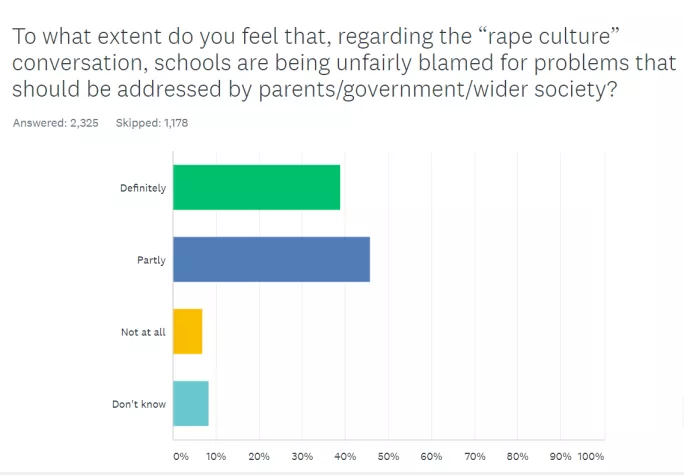More than four in five teachers and school staff think that, on sexual harassment and “rape culture”, schools are being “unfairly blamed”, a Tes survey has found.
Of those responding to the survey, 85 per cent said they thought schools were “definitely” (chosen by 39 per cent of respondents) or “partly” (46 per cent) being blamed for problems that should be addressed by parents, the government and wider society.
Secondary school staff were the most disillusioned: two in five (40 per cent) said they felt schools are being “definitely” blamed in the “rape culture” conversation, compared with one in three primary school staff (35 per cent).
Exclusive: Half of teachers need more help on pupil sexual conduct
Revealed: Rape and revenge porn among secondary students
Ofsted: Assume sexual harassment taking place, heads told
About the same percentage of respondents across primary, secondary and special schools said they felt schools were being partly blamed.
One respondent said: “I think schools have a responsibility but this should never take the emphasis off society and the immediate family.
“We cannot encourage change and positive behaviour in a toxic society. They leave school at 3.30, they need to be embedded in a society that reinforces positive messages so that they leave school and the positive message and learning can continue.”
Other respondents echoed this view that schools are a mirror of the wider society.
“There are some issues around the way girls and women are treated, and it definitely isn’t down to schools. What happens in schools reflects wider society,” one respondent commented.
Another added that the government needed to take a lead on the issue: “The misogyny in younger males is the worst I’ve seen it. We have worked hard to address it but it needs back-up from home and the police. A government campaign would be an excellent idea.”
One teacher said schools are being asked to “to fill the gaps left by social services”, while another pointed out that they need more expertise and funding to effectively deal with the problem: “As a parent and teacher, I believe schools are seen as the avenue to deal with all societies ills, yet the expertise and funding is seriously lacking.
“An analogy would be that you wouldn’t ask a dentist to operate on a patient with a heart defect; they are both in the medical profession but in totally different fields.
“As a maths teacher, I am not not an expert in teenage mental health or the effects of poverty and deprivation on my learners, yet I am asked to deal with this on a daily basis.
“Surely these issues, like the heart defect patient, require the correctly trained professionals to deal with them. Likewise the ‘rape culture’.”
But another respondent argued: “There are too many adults working in school who will brush off sexualised comments from peer to peer as ‘harmless fun’ or ‘banter’. Schools are definitely part of the problem.”
Giving a statement on the Ofsted review into sexual harassment in schools to the house of commons, children’s minister Vicky Ford admitted that schools cannot tackle this “cultural issue” on their own: “This is a cultural issue. We do expect schools and colleges to have robust policies in place to create a culture that treats all young people fairly, and addresses concerns immediately.
“But schools and colleges cannot do that alone and they shouldn’t think they have to.
“We expect every local safeguarding partnership to reach out to all their schools and be clear on how they are engaged on local safeguarding arrangements,” she added.





